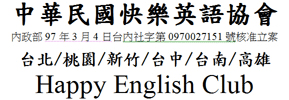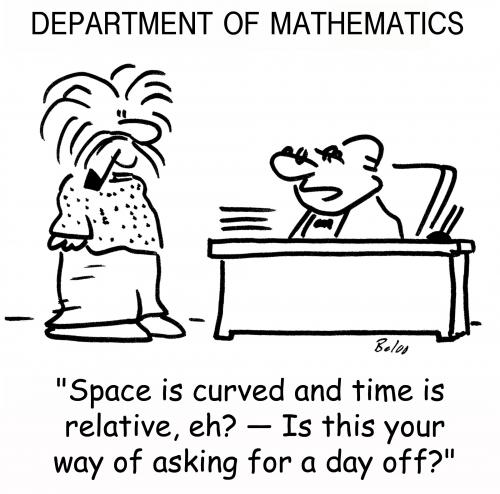論壇 http://www.happyforum.org/happy/ 歡迎至論壇討論
歡迎加入Taichung Happy English Club粉絲團

Time:第 362會,2016年9月 3 日(週六)下午2:30~5:30
Place:
viewtopic.php?t=15
Agenda
14:30~15:30 Session One
15:30~15:50 Speech Session
15:50~16:00 Change Group and then Break Time
16:00~17:15 Session Two
17:15~17:30 Happy Time
Host: Howard
Assistant Host:
Topic:
Time
Source:
The following article and questions are from the book “Good Chats” by Lynne Sandsberry & Paul Sorenson.
Most people today insist that there is an inadequate amount of time to meet all the demands of their jobs, their families, and the modern world. Even with all the time-saving devices of modern industrial society, many people still lead hectic lives. They make commitments to do things every evening after work and use their weekends to catch up on housework and sleep. Modern transportation gets them quickly from home to office to health club to restaurant. People can now pack more activities into a single day than their ancestors dreamed possible, yet they still seem to be always running out of time. With constant interruptions from telephone calls or visitors, they are unable to make time for everything that requires attention. Sometimes so many things are going on at once that they feel overwhelmed, desperately in need of some breathing space in which they can collect their thoughts. Spare time can be hard to find, and when the boss pops his head in the door to ask, "Do you have a minute?", the temptation is to say, "No!"
The modern obsession with scheduling our time more efficiently has resulted in a number of books on the subject of time management. These books have not only made popular a number of excellent time-saving techniques, but also several time management expressions. According to the experts, we can learn to "budget our time," planning in advance to allocate a certain block of time to accomplish a task, and taking shortcuts to complete some tasks more easily. Specific techniques include: limiting phone conversations that may cut into our time; tackling the hardest task first, and at a time of day when one is usually high by productive; breaking a large task down into manageable parts; keeping a running list of shopping needs, to cut back on the number of trips to the store; assigning priorities to every task and setting aside time for each task according to its importance.
Most time management plans include an orderly desk for doing all paperwork, with a well-organized filing system for letters, bills, and so on. The desk drawers are kept tidy so that nothing gets misplaced, and the top is kept clear in order to eliminate distractions. Ideally, this orderliness is reflected in the rest of the house, where there is "a place for everything, and everything in its place. In such an environment, there would even be time to devote to those long-range projects one had been putting off for years, not to mention meeting regular deadlines for getting things done.
However effective these techniques may be in managing time, people seem to resist being managed and to structuring their lives according to appointment calendars. When they face a dull or difficult task, a sunny Saturday provides them with a good reason for procrastinating one more week, and even a disciplined worker cannot ignore the demands of his family and friends indefinitely. People who do succeed in keeping a busy schedule for very long often end up feeling that, in fact, they have spread themselves too thin! They now have insufficient interest in, or energy for, any of their activities, because they have given each too little time. They discover that there really wasn't enough time, after all.
Please Note:
Venue:台中市南屯區 大業路182號 Mos Burger二樓
Thanks a lot for your attention.
Questions:
1. When you sit down to work, are you able to give the work your full attention, or do you often get interrupted? What tends to disturb your concentration when you try to work? Do you have any ideas for getting rid of these distractions so that we can work more efficiently?
2. Sometimes routine chores seem to use up a lot of time. What household tasks do you tend to spend a lot of time on? Are there any tasks that you tend to put off? Do you ever tend to do two things at once to save time? What time-saving methods do you use?
3. Do you feel that your life is much too busy, a little too busy, or not busy enough? Why?
4. How do you organize your time? Do you plan activities in advance? Do you use a desk or pocket calendar to schedule appointments and keep track of events?
5. How much time do you spend with your family? What do you do together? Do you feel that you spend your time with your family well?
6. How can a busy person make more time for his family and friends? Do you have any ideas about this?
7. Speaking of houses, what does yours look like? Fairly tidy, or rather messy? Which room is the tidiest in your house, and which is the messiest?
8. Someone said that an orderly desk is the sign of an orderly mind but someone else joked that an orderly desk is the sign of a diseased mind. What do you think of that?
例會須知
時間地點須知:
http://www.happyforum.org/happy/viewtopic.php?f=2&t=15
協會章程:
http://www.happyforum.org/Association_Principle.htm
各分會章程:
http://www.happyforum.org/Club_Principle.htm
協會會員會費及各分會會員會費及入場費:
http://www.happyforum.org/15.htm
參與例會,請自行列印當週的討論文章,並帶至現場
http://www.happyforum.org/happy/viewforum.php?f=33
參與例會,請勿討論政治/種族/宗教/性,經勸導無效者,不得參加本會任何活動
http://www.happyforum.org/happy/viewtopic.php?f=1&t=1766
週六晚餐(Saturday Dinner)
http://www.happyforum.org/happy/viewforum.php?f=76
戶外活動(Club Outing)
http://www.happyforum.org/happy/viewforum.php?f=72
所有行程(All Schedule)
http://www.happyforum.org/happy/viewtopic.php?t=883









